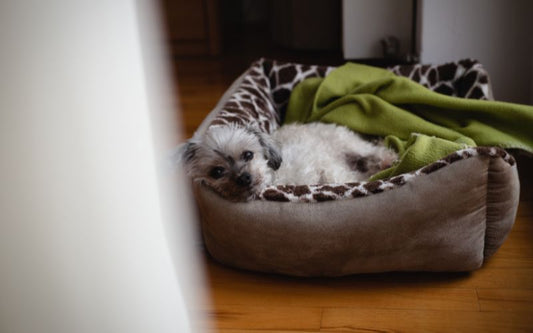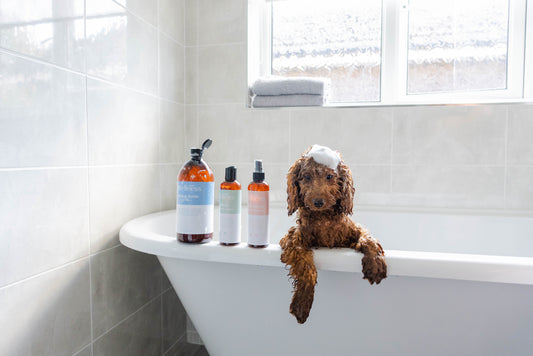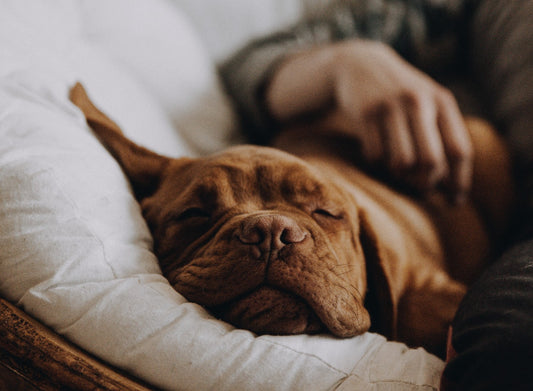It’s completely normal as a new puppy owner to feel all kinds of emotions through your puppy’s early months.
From the abundance of joy and love you’ll get watching them play, to your patience wearing thin once they’ve chewed something they shouldn’t have.
Standing amongst the chaos, you might be wondering ‘when do puppies calm down?’ and although the process can be challenging, we promise you it will be worth it!
If you want to understand a little more about your puppy’s endless energy and pick up a few tips to keep them calm in the younger months then keep reading.
- Is it normal for puppies to have a lot of energy?
- How long do puppies have high energy for?
- At what age are puppies most hyper?
- When do puppies start to calm down?
- How to manage your puppy’s high energy

🛒 Shop the look: Cocker Spaniel Puppy wears Barc London's Liquorice Stripe Dog Harness
Is it normal for puppies to have a lot of energy?
Yes! Just like babies, puppies are curious creatures looking to explore the world and figure out their boundaries.
They’re learning every day - whether that’s by zooming around the room to explore their new surroundings, or using their mouths to examine whatever they can get their paws on (more often than not, that might include your trainers!).
But there are other factors that can impact your pup’s energy levels, such as their breed, gender and social structure.
How long do puppies have high energy for?
Generally, most puppies will start to settle between 6 - 12 months, but as mentioned above there are a few other factors that can impact puppy energy levels.
Some might say that female dogs are calmer dogs due to the fact they mature quicker than males, however a more impactful factor to consider would be their breed.
Dog breeds with a higher active nature, like a Border Collie or a Springer Spaniel, may take up to two years before they start to settle, and even then you will need to meet their exercise needs to curb their high energy levels.
At what age are puppies most hyper?
Puppies' energy levels follow a rough timeline as they grow into adult dogs, from their first few weeks all the way through to maturity, but you may find they’re at their most hyper at two stages in their journey.
The first stage occurs between 10 - 16 weeks. Also known as the teenage phase, this stage is where their rebellious streak kicks in.
Don’t be alarmed if they start acting up and ignoring your commands for literally anything else in the room. It’s important to persevere with basic dog training here and stop inappropriate dog chewing using lots of positive reinforcement.
A second wind of increased energy might come between 6 - 12 months of age, and puppies at this age can bring continued boundary testing and mischievous behaviour if they become bored.
Continuing your training, socialisation and play sessions during this stage will help redirect that mischievous energy and keep your puppy physically and mentally engaged.
💡 Top Tip: Find out when a puppy becomes a dog with our guide to a dog's life cycle.
When do puppies start to calm down?
Most puppies start to calm down as they approach their maturity age, which is usually around 12 months, but for larger breeds it can be more likely to occur between 18 months and 2 years.
By this age of a dog's life, they will have learned the rules on how to act, and you can safely say that you have survived puppyhood!
How to manage your puppy's energy:
There are plenty of things you can do to help manage your puppy’s excess energy while also keeping your mind sane!
1. Create Structure
The first, and maybe most useful while your puppy is so young, would be to create structure.
By sticking to a routine and having specific time windows for things like feeding, walks, toilet breaks and play sessions, your puppy will learn what to expect from their day.
This reduces the risk of them becoming stressed, and also helps to limit hyperactivity to certain times of the day (ie: playtime).
2. Crate Training
You could also try crate training, which provides a safe space for your pup to settle and can help them differentiate between ‘chill time’ and ‘go time’.
As much as they might think they can run all day, your puppy needs regular naps and rest to ensure they stay healthy and their bones develop correctly, so a crate, or dedicated doggy den is perfect for this.
Giving your pup a space that is just for them can also help with building their independence, reducing the risk of anxious behaviours when they inevitably have to be left alone.
💡 Top Tip: Without structure, a puppy can become stressed, hyper and unhappy. A solid routine can improve sleep and prevent a dog from barking through the night.
3. Meet their Exercise Needs
You’ll also want to make sure your pup is getting the right amount of exercise for their age.
Look for positive outlets that can channel their energy, whether that’s a quick game of fetch or playing hide and seek in the house, practising their obedience training or using interactive toys like a kong or a snuffle mat.
These outlets are great for reducing boredom. Brain games for dogs help to provide mental stimulation, which in turn can reduce mischievous behaviours.
4. Walks & Socialisation
Another way to channel their energy is through walks and socialisation, both of which stimulate a pup physically and mentally.
If your pup is fully vaccinated you’ll be able to hit the streets, but if you’re still waiting for their second vaccine to take your puppy for a walk, why not arrange a playdate in the garden with a friend or family member’s vaccinated pup?
You can catch up with a friend, while your pups engage in a little harmless wrestle!

A few of our top tips for calming your hyper puppy:
- Build a routine, the structure will help eliminate boredom, inducing misbehaviours and may save a chair leg from being chewed!
- Channel their energy through positive outlets while you’re waiting for their vaccinations. A few play sessions with chew toys or squeaky toys, and hiding treats around the house are great places to start, and will get their minds racing.
- Enrol in a puppy training class once your pup has had their last vaccine. With your help and that of a skilled dog trainer, they will safely learn the basics in obedience and also start to socialise with other pups of a similar age. Both of these factors can provide much needed mental development for younger dogs.
- Be patient. We know this may seem challenging at times, but the calmer you stay, the calmer they will be. By getting stressed or angry with your puppy, you risk exacerbating the situation, which can cause more hyperactivity. So remember to breath, and approach puppyhood with a patient and positive approach.
And finally, maybe the most important of all - remember to have fun and find your inner puppy!
Explore the world with your new best friend, heading to new places and maybe even building new friendships at the park, taking pleasure in the silliness they bring to your life while you help them learn and grow.
If you do all of this, there’s no doubt your energetic puppy will grow into a calm and loving companion when he or she reaches the older dog years.



2 comments
I have a pit bull boxer mix . I got her when she was 3 months old The owner said she could let her and her siblings go until then.
I have never create trained, this was hard for me as it was her. The person who had the puppies did not try to house train them. I was constantly cleaning urine and poop. I just got her trained to walk with a leash and doing better with going outside to potty. Being consistent is key but hard at times. I do love her and I know she loves me. I do get after her all I have to say is"what did you do?" She looks at me with green eyes and I talk to her like a human lol 😆
My puppy is two and he hasn’t called down at all. Not mad about it. He will drop his ball on you all the time and stalk you until you throw it. Hell also squeak it all night in your ear while you sleep.